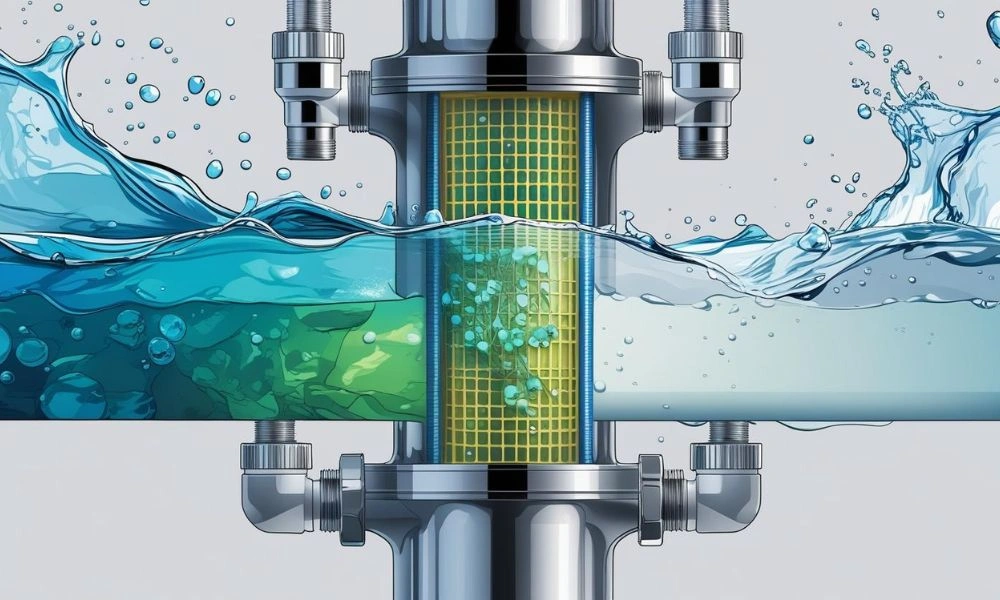In comparing ultra-filtration vs reverse osmosis, it’s clear that each method has its own unique set of benefits. Ultra-filtration is great for cost-effective, low-energy filtration of bacteria and suspended solids, while reverse osmosis excels in providing pure water by removing a broad range of contaminants. Choose the system that fits your specific water quality and needs.
Ultra-filtration Water Plant
What are the differences between ultra-filtration and reverse osmosis?
Water treatment technologies have progressed very much in the past few years, providing different means to provide clean, safe water. Ultra-filtration (UF) and reverse osmosis (RO) are two of the most widely used methods of water filtration. Both are used extensively for residential and commercial water treatment but are very different in their processes, advantages, and uses.
In this post, we will contrast the advantages of ultra-filtration and reverse osmosis, examining the differences between them, advantages and disadvantages, and how they function. Knowing both the technologies, you can decide which filtration system is most suitable for your requirements.
What is Ultra-Filtration (UF)?
Ultra-filtration is a membrane process of filtration that eliminates suspended solids, bacteria, and certain viruses from water. It is a process that applies a semi-permeable membrane to strain particles above 0.01 microns out, but let pass smaller molecules like water and dissolved salts.
Major Characteristics of Ultra-Filtration:
- Removes more massive particles, including bacteria and certain viruses.
- Keeps desirable minerals like calcium and magnesium.
- Filters water at the molecular level with pore sizes ranging between 0.01 to 0.1 microns.
- Does not need chemicals or high pressure to operate.
Advantages of Ultra-Filtration:
- Retention of Important Minerals: As UF does not strip away minerals such as calcium and magnesium, it ensures the natural taste and health qualities of water.
- Lower Energy Consumption: UF is more energy-efficient compared to RO systems, which makes it a cost-effective option for domestic and small business use.
- Less Maintenance: Ultra-filtration units normally need less maintenance since they don’t operate at high pressure, and they are easier to clean and replace.
- Good for Turbid Water: UF is very effective in removing suspended solids from water, such as turbidity, and so it is well suited for applications where water clarity is crucial.
- No Wastewater Required: In contrast to RO, which creates wastewater, UF systems have a relatively greater recovery rate, such that nearly all the treated water can be utilized.
What is Reverse Osmosis (RO)?
Reverse osmosis is a more sophisticated filtration process that employs the use of a semi-permeable membrane in removing a broad spectrum of contaminants from water, such as salts, bacteria, viruses, heavy metals, and other dissolved solids. RO systems work at high pressure and press water through the membrane, which excludes contaminants larger than 0.0001 microns.
Key Features of Reverse Osmosis:
- Squeezes out most contaminants, such as dissolved salts, heavy metals, chemicals, and microorganisms.
- Filters water at the molecular level with pore diameters ranging between 0.0001 to 0.001 microns.
- Needs high pressure to pressurize the water through the membrane.
- Comes with wastewater as a byproduct.
Advantages of Reverse Osmosis:
- Eliminates Nearly All Contaminants: RO is capable of eliminating a broad spectrum of contaminants, such as dissolved salts, heavy metals, chlorine, and microorganisms, and hence is most suitable for locations with poor quality water.
- Yields Pure, Clean Water: The output is water that is practically 100% pure, containing hardly any dissolved solids remaining.
- Best for Desalination: RO is the preferred technique for desalinating seawater or brackish water, hence making it indispensable in locations where freshwater resources are scarce.
- Enhanced Taste: By eliminating chlorine and other impurities, RO enhances the taste and smell of water, rendering it more appealing to consume.
- High Filtration Efficiency: RO systems usually possess a high filtration efficiency, eliminating even very small particles from the water.
Green & Blues
Key Differences Between Ultra-Filtration and Reverse Osmosis
Both ultra-filtration and reverse osmosis are effective filtration methods, but they differ significantly in their capabilities, cost, and applications.
| Feature | Ultra-Filtration (UF) | Reverse Osmosis (RO) |
|---|---|---|
| Filtration Efficiency | Removes particles larger than 0.01 microns | Removes particles larger than 0.0001 microns |
| Water Recovery | High water recovery (less waste) | Lower water recovery (wastewater produced) |
| Energy Consumption | Low energy usage | High energy usage due to high-pressure systems |
| Contaminant Removal | Removes bacteria, viruses, and suspended solids | Removes dissolved solids, salts, heavy metals, chemicals, and microorganisms |
| Mineral Retention | Retains beneficial minerals | Removes most minerals, leaving pure water |
| Cost | More affordable, lower maintenance | Higher initial cost, more complex maintenance |
Which One Will You Opt For?
The decision between ultra-filtration and reverse osmosis relies on your needs and water quality.
Opt for Ultra-Filtration If:
- You’re in search of lower energy usage and cost-effectiveness.
- Your water has primarily suspended solids, bacteria, and a few viruses, but no high concentrations of dissolved salts or chemicals.
- You want to keep good minerals in your drinking water.
- You require a system that does not produce wastewater.
Select Reverse Osmosis If:
- You require the removal of a broad variety of contaminants, such as heavy metals, salts, and chemicals.
- You are purifying brackish water or seawater and require high-quality, pure water.
- You care about water taste and would like to have the cleanest water available.
- You do not have objections to increased energy usage and wastewater generation in the process.
Conclusion
Both ultra-filtration and reverse osmosis have immense advantages based on your water purification requirements. Ultra-filtration is an economical, low-energy method for purifying water with suspended solids and bacteria, whereas reverse osmosis gives high-quality, pure water by eliminating a wider array of contaminants, such as dissolved salts and heavy metals.
By knowing the strengths of every system, you can better decide which technology will best suit your needs for water purification.
Frequently Asked Questions (FAQs)
1. What is the main difference between ultra-filtration (UF) and reverse osmosis (RO)?
Ultra-filtration removes larger particles like bacteria and suspended solids, while reverse osmosis removes a broader range of contaminants, including salts, heavy metals, and chemicals, producing purer water.
2. Does ultra-filtration remove dissolved salts and heavy metals?
No, ultra-filtration primarily removes larger particles such as suspended solids, bacteria, and some viruses, but it doesn’t effectively remove dissolved salts, heavy metals, or chemicals.
3. Which filtration system is more energy-efficient: UF or RO?
Ultra-filtration (UF) is more energy-efficient than reverse osmosis (RO). UF operates at lower pressures and does not require high energy input, making it cost-effective for domestic use.
4. What are the advantages of ultra-filtration over reverse osmosis?
Ultra-filtration is less energy-intensive, has higher water recovery (less waste), retains beneficial minerals in water, and requires lower maintenance compared to reverse osmosis.
5. What contaminants does reverse osmosis remove?
Reverse osmosis removes a wide range of contaminants, including dissolved salts, heavy metals, chemicals, chlorine, bacteria, and viruses, resulting in nearly pure water.
6. Does reverse osmosis waste water?
Yes, reverse osmosis systems generate wastewater as a byproduct, typically discarding about 3-4 times the amount of filtered water, unlike ultra-filtration, which has a higher water recovery rate.
7. Can reverse osmosis be used for desalination?
Yes, reverse osmosis is commonly used for desalinating seawater or brackish water to make it safe for consumption, making it ideal for areas with scarce freshwater resources.
8. Which filtration system is better for keeping essential minerals in water?
Ultra-filtration retains healthy minerals like calcium and magnesium, while reverse osmosis removes most minerals, resulting in purified but mineral-depleted water.
9. Which system is more expensive: UF or RO?
Reverse osmosis typically has a higher initial investment and more complicated maintenance compared to ultra-filtration, which is a more cost-effective and lower-maintenance option.
10. How do I decide which system to choose—UF or RO?
Choose ultra-filtration if you need lower energy usage, cost-effectiveness, and higher water recovery, especially for water with suspended solids. Opt for reverse osmosis if you need to remove a broader range of contaminants, including salts and heavy metals.



